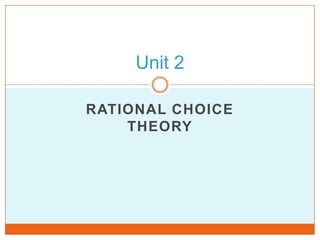Unit 2
•Download as PPTX, PDF•
4 likes•1,342 views
Report
Share
Report
Share

Recommended
More Related Content
What's hot
What's hot (20)
Diss lesson-5-dominant-approaches-and-ideas-in-social-sciences

Diss lesson-5-dominant-approaches-and-ideas-in-social-sciences
Introduction to the Disciplines of Applied Social Sciences

Introduction to the Disciplines of Applied Social Sciences
Viewers also liked
Viewers also liked (20)
Routine activity & rational choice theory final project

Routine activity & rational choice theory final project
474 2015 rational choice & psychological models of decision making up

474 2015 rational choice & psychological models of decision making up
Similar to Unit 2
Similar to Unit 2 (20)
501567688-HUMSS-11-DISS-Rational-Choice-Theory.pptx

501567688-HUMSS-11-DISS-Rational-Choice-Theory.pptx
Chapter 4 Administration Responsibility The Key to Administrativ.docx

Chapter 4 Administration Responsibility The Key to Administrativ.docx
PHI 210RS – Module 3 Case Analysis Rubric Identify the .docx

PHI 210RS – Module 3 Case Analysis Rubric Identify the .docx
Why social policy needs more than the behavioural economics bandwagon

Why social policy needs more than the behavioural economics bandwagon
11.capability approach and multidimensional poverty analysis

11.capability approach and multidimensional poverty analysis
Capability approach and multidimensional poverty analysis

Capability approach and multidimensional poverty analysis
The problem with our democratic institutions is that they dont cor.pdf

The problem with our democratic institutions is that they dont cor.pdf
More from Saurabh Chauhan
More from Saurabh Chauhan (6)
Recently uploaded
https://app.box.com/s/x7vf0j7xaxl2hlczxm3ny497y4yto33i80 ĐỀ THI THỬ TUYỂN SINH TIẾNG ANH VÀO 10 SỞ GD – ĐT THÀNH PHỐ HỒ CHÍ MINH NĂ...

80 ĐỀ THI THỬ TUYỂN SINH TIẾNG ANH VÀO 10 SỞ GD – ĐT THÀNH PHỐ HỒ CHÍ MINH NĂ...Nguyen Thanh Tu Collection
Making communications land - Are they received and understood as intended? webinar
Thursday 2 May 2024
A joint webinar created by the APM Enabling Change and APM People Interest Networks, this is the third of our three part series on Making Communications Land.
presented by
Ian Cribbes, Director, IMC&T Ltd
@cribbesheet
The link to the write up page and resources of this webinar:
https://www.apm.org.uk/news/making-communications-land-are-they-received-and-understood-as-intended-webinar/
Content description:
How do we ensure that what we have communicated was received and understood as we intended and how do we course correct if it has not.Making communications land - Are they received and understood as intended? we...

Making communications land - Are they received and understood as intended? we...Association for Project Management
Recently uploaded (20)
Micro-Scholarship, What it is, How can it help me.pdf

Micro-Scholarship, What it is, How can it help me.pdf
ICT Role in 21st Century Education & its Challenges.pptx

ICT Role in 21st Century Education & its Challenges.pptx
General Principles of Intellectual Property: Concepts of Intellectual Proper...

General Principles of Intellectual Property: Concepts of Intellectual Proper...
80 ĐỀ THI THỬ TUYỂN SINH TIẾNG ANH VÀO 10 SỞ GD – ĐT THÀNH PHỐ HỒ CHÍ MINH NĂ...

80 ĐỀ THI THỬ TUYỂN SINH TIẾNG ANH VÀO 10 SỞ GD – ĐT THÀNH PHỐ HỒ CHÍ MINH NĂ...
ICT role in 21st century education and it's challenges.

ICT role in 21st century education and it's challenges.
Making communications land - Are they received and understood as intended? we...

Making communications land - Are they received and understood as intended? we...
UGC NET Paper 1 Mathematical Reasoning & Aptitude.pdf

UGC NET Paper 1 Mathematical Reasoning & Aptitude.pdf
Beyond_Borders_Understanding_Anime_and_Manga_Fandom_A_Comprehensive_Audience_...

Beyond_Borders_Understanding_Anime_and_Manga_Fandom_A_Comprehensive_Audience_...
Jual Obat Aborsi Hongkong ( Asli No.1 ) 085657271886 Obat Penggugur Kandungan...

Jual Obat Aborsi Hongkong ( Asli No.1 ) 085657271886 Obat Penggugur Kandungan...
Unit 2
- 2. Introduction Rational choice theory is the view that people behave as they do because they believe that performing their chosen actions has more benefits than costs. That is, people make rational choices based on their goals, and those choices govern their behavior. Some sociologists use rational choice theory to explain social change. According to them, social change occurs because individuals have made rational choices.
- 3. Contd… For example, suppose many people begin to conserve more energy, lowering thermostats and driving less. An explanation for this social change is that individual people have decided that conserving energy will help them achieve their goals (for example, save money and live more healthfully) and cause little inconvenience. Critics argue people do not always act on the basis of cost- benefit analyses.
- 4. Assumptions Humans are purposive and goal oriented. Humans have sets of hierarchically ordered preferences, or utilities. In choosing lines of behavior, humans make rational calculations with respect to: the utility of alternative lines of conduct with reference to the preference hierarchy the costs of each alternative in terms of utilities foregone the best way to maximize utility.
- 5. Contd… Emergent social phenomena -- social structures, collective decisions, and collective behavior -- are ultimately the result of rational choices made by utility-maximizing individuals. Emergent social phenomena that arise from rational choices constitute a set of parameters for subsequent rational choices of individuals in the sense that they determine: the distribution of resources among individuals the distribution of opportunities for various lines of behavior the distribution and nature of norms and obligations in a situation.
- 6. Contd… Attempts to explain all (conforming and deviant) social phenomenon in terms of how self-interested individuals make choices under the influence of their preferences. It treats social exchange as similar to economic exchange where all parties try to maximize their advantage or gain, and to minimize their disadvantage or loss.
- 7. RCT's basic premises 1. human beings base their behavior on rational calculations, 2. they act with rationality when making choices, 3. their choices are aimed at optimization of their pleasure or profit. RCT, however, cannot explain the existence of certain social phenomenon such as altruism, reciprocity, and trust, and why individuals voluntarily join associations and groups where collective and not individual benefits are pursued.
